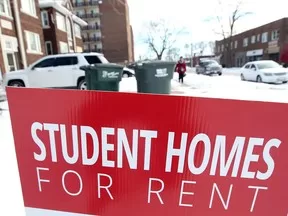Impact expected to be negligible
Article content
The federal government says its new limit of issuing about 360,000 international study permits — 215,000 or so less than in 2023 — can alleviate pressures on housing, health care and other services, but some economists expect the impact to be negligible on the economy.
“The impact will be marginal at the macro level,” Bank of Nova Scotia economist Rebekah Young, said. “They capped it at 360,000, but we still have an annual permanent resident target of 500,000 and the temporary foreign worker program, too. We are now likely looking at a population (growth) of one million instead of 1.2 million. That is still very strong.”
Advertisement 2
Article content
Article content
The two-year cap was announced last week by Immigration Minister Marc Miller, who said the foreign student program was in a “bit of a mess” due to some unethical institutions with “sham” commerce degree programs that students didn’t even attend.
“We have got two years to actually get the ship in order … those institutions need to be shut down,” he said last week.
Although about 575,000 study permits were issued last year, there were some 970,000 people in the country with such permits as of October 2023. This is because people can have multiple study permits or even decide against coming to Canada after getting a permit approved.
Claire Fan, an economist from the Royal Bank of Canada, said that even if one were to equate each permit to an individual and consider a potential decrease of 215,000 students annually — as per the cap — that would represent just 0.5 per cent of the current Canadian population.
“That figure gives you an idea,” she said. “Do we really expect a material change from a macro-perspective, when it comes to inflation, consumer demand and interest rates? I would say it’s very negligible.”
Article content
Advertisement 3
Article content
Young added that one in three non-permanent residents, which includes international students, live in unsuitable spaces, meaning there aren’t enough bedrooms for the size and composition of the household. This could mean that a reduction in the number of study visas may not open up as much accommodation as expected.
As such, neither Fan nor Young expect rental rates to come down because of the new measure, but they do expect them to grow at a slower pace in the near future. The economists said authorities should focus more on policies that make it easier to build more homes.
“There’s a lot of scapegoating for some of the structural problems in our economy. Newcomers didn’t cause them. They kind of exposed them and are now bearing the brunt of these issues,” Young said. “We wouldn’t have needed a cap had there been better checks and balances in the system, and the clear abuses that were happening.”
But Bank of Montreal economist Robert Kavcic said the supply side of the housing market has been running at full capacity and that there has been excess demand on top of that.
“For the past few years, we have had little from policymakers other than we need to build more, and for the past few years, we have said that’s the wrong approach because we are already building all we can,” he said.
Advertisement 4
Article content
Based on the current number of houses being built, Canada can accommodate the 500,000 permanent residents it aims to annually bring in until 2026, Kavcic said.
But the country’s population grew by more than one million in each of the past two years, mostly due to a steep increase in non-permanent residents, which includes students and temporary workers. That’s “well beyond what we are able to supply,” he said.
Although Kavcic doesn’t expect “outright declines” in rental prices because of the move, he thinks increases will slow down. The move could also make the Bank of Canada’s goal of tackling rising prices “much easier” provided there’s a meaningful decrease in the number of students, he added.
Such a decrease, though, could also lead to a rise in wages next year since foreign students have been a steady source of cheap labour, Benjamin Tal, an economist at CIBC World Markets Inc., said. But he added the decrease isn’t a negative effect for the economy since it would compel companies to pay more and be more productive.
“Canada has a productivity issue,” he said. “An endless supply of cheap labour is not good for companies.”
Advertisement 5
Article content
Recommended from Editorial
But Daniel Tisch, chief executive of the Ontario Chamber of Commerce, in a statement on Jan. 26 said the caps could be “potentially damaging” to the labour market and the regional economy given that the province’s study permits are expected to decrease by 50 per cent.
While he said there are problems in the student visa system, he said the new cap policy fails to differentiate between “responsible institutions and those exploiting international students.” He added it’s important to maintain a “strong, skilled talent pipeline” for the province that “guarantees student access.”
It will take a while for the new policy to be implemented and see its effects, but economists such as Tal already believe it’s likely that the government will extend the curbs for more than two years.
He doesn’t, however, expect the move to resolve the affordability issue.
“This is not enough,” Tal said. “You also need supply. Much more supply of units.”
• Email: nkarim@postmedia.com
Bookmark our website and support our journalism: Don’t miss the business news you need to know — add financialpost.com to your bookmarks and sign up for our newsletters here.
Article content
